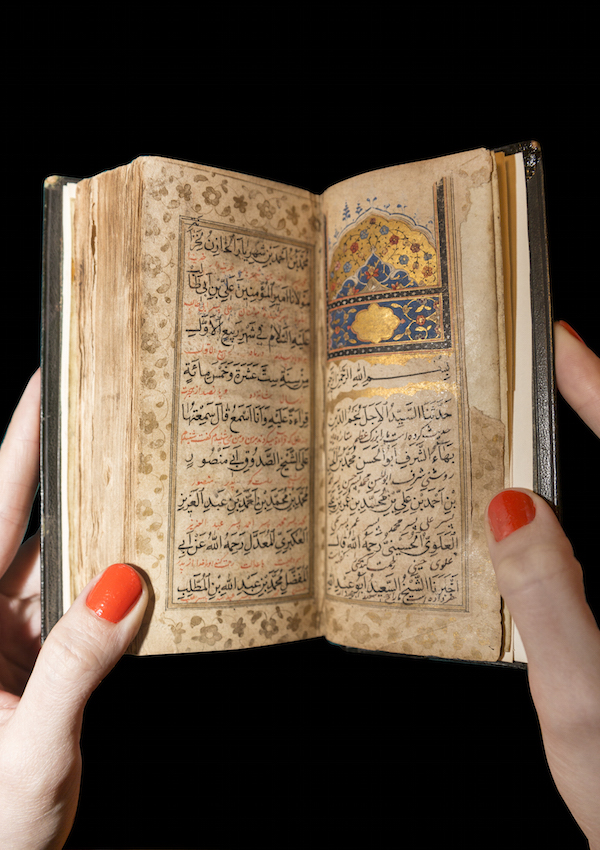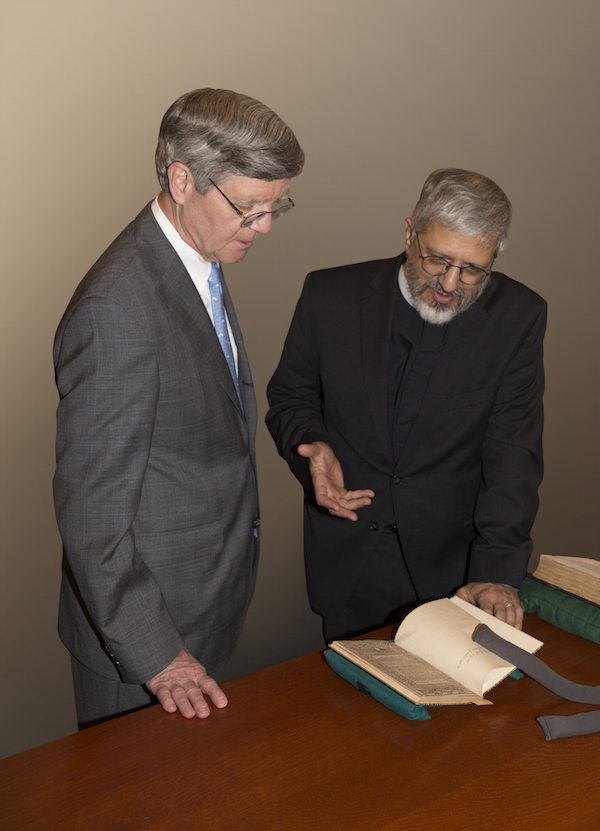Seminary Donates Bexley Hall Rare Book Collection to the Newberry Library
Bexley Seabury’s July 2016 consolidation from two campuses to one, in Chicago’s historic Hyde Park/Woodlawn district, presented an opportunity to steward the seminary’s historic collection of early Bibles, Books of Common Prayer and other volumes. What better home for precious works on religion and culture that constitute the Bexley Hall Rare Book Collection than Chicago’s Newberry Library?

Among the rare finds in the Bexley Hall Rare Book Collection is this book of oral history in Arabic, with interlinear explanations in Persian (ca. 1680).
“As one of Chicago’s richest centers for scholarship and culture, the Newberry is the ideal home for the Bexley Hall collection,” said Bexley Seabury President Roger A. Ferlo. “We are delighted to enhance the already impressive archive on the history of religions at the Newberry Library, and share our resources with the community.”

Bexley Seabury President Roger Ferlo and Academic Dean Therese DeLisio view an Irish translation of the Bible (1681).

Newberry President David Spadafora and President Roger Ferlo view a volume by Erasmus, Apologia ad Jacobum Fabrum Stapulensen (1518).
Early Bibles and works by Erasmus, and other rarities
The Bexley Hall Rare Book Collection consists of over 325 titles and over 120 bound volumes containing approximately 1,200 nineteenth-century pamphlets. Among the books in the collection are early Bibles and Books of Common Prayer, early printings of works by Erasmus, and works of theology, philosophy, and travel.
“Bexley Seabury has stewarded this remarkable rare-book collection with great care and expertise,” said Newberry President David Spadafora. “We look forward to building on their excellent work and welcoming the collection’s current users into our community of learning and scholarship.”
Some volumes solicited by Bishops Chase and McIlvaine
For years after Bexley Hall Seminary was founded in 1824 by Philander Chase, first Episcopal Bishop of Ohio, many books came from England. Bexley Hall acquired these books in response to requests by Chase and Charles Pettit McIlvaine, who succeeded Chase as second Bishop of Ohio and president of Kenyon College. Bishop McIlvaine was instrumental in assembling the extraordinary collection of nineteenth-century pamphlets that form the core of the Bexley Seabury gift to the Newberry.
Other religious works at the Newberry
The Newberry has long been a pre-eminent repository for works on the history of religions. Rare early Bibles and illuminated Books of Hours were among the works that the Newberry acquired with the Henry Probasco Collection in 1889; the John M. Wing Foundation on the History of Printing includes many theological titles. In the last decades, a number of seminaries have transferred their libraries to the Newberry, among them Mundelein College, Catholic Theological Union, Concordia University, Dominican Friars of the Province of Saint Albert the Great, and McCormick Theological Seminary.
Titles in the Bexley Hall Collection will be available at the Newberry as they are catalogued by staff.
Fall 2017 exhibit will showcase some titles
The gift of the Bexley Hall Collection coincides with a major Newberry project titled “Religious Change, 1450-1700.” With funding from the Andrew W. Mellon Foundation, the Newberry is modeling an institutionally integrative approach to produce an exhibition and accompanying digital resources and programming for the fall of 2017.
Staff from across the institution, and external scholar-advisors, have drawn on materials from all parts of the Newberry collection to tell the story of how new religious ideas, disseminated through print, challenged traditional authorities and thrust the medieval world into the modern age.
The Bexley Hall Collection will contribute important works to the study of this topic as well as deepen the Newberry collection of early nineteenth-century American imprints from small towns where presses were often set up to print sermons and religious tracts.
